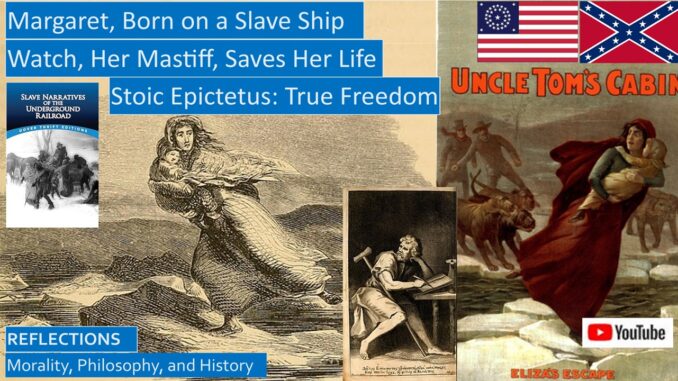
Included in the Slave Narratives of the Underground Railroad is why and how Margaret spontaneously fled from slavery when threatened with a humiliating whipping by a cruel master. She told her story to Eber Pettit, this is her account.
“On the Eastern shore of the Chesapeake, in the State of Maryland, there lived a remarkable woman by the name of Margaret. She was born on a slave ship on its way from Africa to Baltimore, just before the importation of slaves was prohibited. She, with her mother, fell into the hands of a family who gave them religious instruction, and Margaret, while young, exhibited traits of character that were regarded as remarkable for one of her race.”
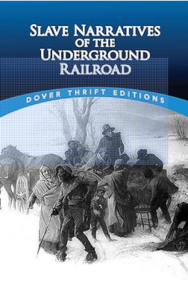
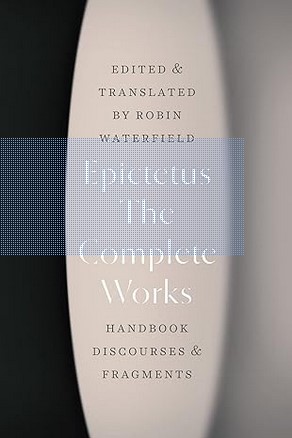
“She had a proud, indomitable spirit, an acute moral sense, a disposition naturally amiable, a cheerful temperament, but crushed with a sense of her degraded condition. She was unusually capable of all kinds of housework and was an especially active and competent nurse when any of the family were sick. By observation, she learned the polite manners and graceful deportment of ladies of the family and those who visited there. Her obedience to every command, her kindness to anyone who was in trouble, and polite deportment toward all,” was from “a conscientious desire to imitate her Savior whom she had early learned to love.”
“At sixteen she went to live with her young mistress” when she married. “At eighteen Margaret was a large woman, tall and well-formed, her complexion black as jet, her countenance always pleasant, though she seldom laughed. She talked but little.” “At twenty she wed a worthy young man to whom she had given her best affections.”
“Not long after, her young master became very angry with her for what he called stubbornness and resistance to his will, and threatened to chastise her by whipping, a degradation that she had always felt that she could not submit to.” “She told him she would not be whipped, she would rather die, and warned him that his attempt would surely result in the death of one of them.”
“Her master knew her too well to risk this and decided to punish her in another way. He sold her husband, and she saw him bound in chains and driven off with a large drove of slaves for the New Orleans market. He then put her in the hands of a brutal overseer, with directions to work her to the extent of her ability on a tobacco plantation,” “up to the day of the birth of her child.”
“It was the custom on the plantations to establish nurseries, presided over by old, broken-down slaves, where mothers might leave their infants during the work hours, but this privilege was denied to Margaret. She was obliged to leave her child under the shade of a bush in the field, returning to it but twice during the long day.”
“On returning to the child one evening, she found it apparently senseless, exhausted with crying, and a large serpent lying across it. Although she felt that it would be better for both her and her child if he were dead, yet a mother’s heart impelled her to try to save her infant, and by caressing and careful handling she resuscitated it.”
HOW MARGARET’S DIGNITY EXEMPLIFIES PHILOSOPHY OF EPICTETUS
More than any other Slave Narrative of the Underground Railroad, Margaret’s character and resolve epitomizes the Stoicism of the Roman Philosopher Epictetus, who was himself a former slave of a former slave.
Epictetus challenges us when he asks whether a tyrant truly enslaves you when he can only control your body and property and send you into exile. No, Epictetus proclaims: “I have been set free by God, I know what he enjoins me to do, no one can enslave me any longer.” “Try your power out on me and you’ll see how far it extends!” Who should I fear if I am truly free in my soul?
Epictetus proclaims: “I consider what God wants to take precedence over what I want. I will be his devoted servant and attendant: God’s inclinations are my inclinations, God’s desires are my desires, God’s wishes are my wishes.”
“Since I am not frightened by anything a tyrant can do to me, and since I don’t crave any of the things he can procure for me, why should I stand in awe of him?”[1]
Margaret was willing to make the best of her situation, she was willing to serve her master’s family as she served Jesus, she compassionately cared for her master’s family, as long as they respected her basic human dignity. Once they crossed that line, without hesitation, she immediately fled for freedom with her infant, guided and protected only by God and the North Star.
Epictetus discusses how the Spartan lawgiver Lycurgus that “slavery is no more bad than good, and freedom no more good than bad,” he proclaims proudly: “If I were a slave and one of these men was my master, I would torment him, even if it earned me a thrashing every day.”[2]
We have previously reflected on my favorite sayings of Epictetus, we are planning a future reflection on how Epictetus and Diogenes of Sinope, who was also enslaved in the latter part of his life, reflect on true freedom from slavery, tyranny, and fear.
Epictetus, Stoic Philosopher
http://www.seekingvirtueandwisdom.com/epictetus-discourses-blog-1/
http://www.seekingvirtueandwisdom.com/epictetus-discourses-blog-2/
https://youtu.be/Dhd543kov-E
Greek Cynic Philosophers, Inspiring Greek Stoics
http://www.seekingvirtueandwisdom.com/diogenes-and-the-greek-cynic-philosophers/
https://youtu.be/zAAal5p8AX8
Major Roman Stoic Philosophers, My Favorite Maxims: Epictetus, Rufus, Seneca & Marcus Aurelius
https://seekingvirtueandwisdom.com/major-roman-stoic-philosophers-my-favorite-maxims-epictetus-rufus-seneca-marcus-aurelius/
https://youtu.be/E0qQgqGkoOE
Greek Stoic and Cynic Philosophers: My Favorite Maxims: Heraclitus, Antisthenes, Diogenes, and Zeno
https://seekingvirtueandwisdom.com/greek-stoic-and-cynic-philosophers-my-favorite-sayings/
https://youtu.be/rq3oRftjM4c
You can also draw inspiration from Viktor Frankl’s Man’s Search for Meaning, where he also describes how man can find meaning in life even in the hopelessness of the Auschwitz Nazi work camps, which was the most cruel form of slavery devised by man.
Viktor Frankl, Man’s Search For Meaning, His Life in a Nazi Concentration Camp in WWII
http://www.seekingvirtueandwisdom.com/viktor-frankl-mans-search-for-meaning-his-life-in-a-nazi-concentration-camp-in-wwii/
https://youtu.be/O-YtC9qGWPI
Viktor Frankl’s Logo-therapy, Man’s Search For Meaning in Life, Love, and Suffering
https://seekingvirtueandwisdom.com/viktor-frankls-logo-therapy-mans-search-for-meaning/
https://youtu.be/1nTYlhDUJh8
MARGARET QUICKLY FLEES TO FREEDOM WITH HER INFANT
Margaret’s account continues: “As soon as she heard her infant’s feeble, wailing cry, she vowed to deliver her boy from the cruel power of slavery or die in the attempt, and falling prostrate, she prayed for strength to perform her vow, and for grace and patience to sustain her in her suffering, toil, and hunger. Pressing her child to her bosom, she fled with all the speed of which she was capable towards the North Star.”
“Having gone a mile or two, she heard something pursuing her; on looking round she saw Watch, the old house dog. Watch was a large mastiff, somewhat old, and with him Margaret had ever been a favorite, and since she had been driven to the field, Watch often visited her at her cabin in the evening.” “At the break of day, she hid herself on the border of a plantation and soon fell asleep.”
“Towards evening she was aroused by the noise made by the slaves returning to their quarters and seeing an old woman lingering behind all the others, she called her, told her her troubles, and asked for food. The old woman returned about midnight with a pretty good supply of food, which Margaret divided with Watch, and then started on taking the North Star for her guide.”
When Margaret was not present at the morning roll call, the Overseer first thought she was hiding nearby and thought that hunger would force her return. When she did not return, he let loose the bloodhounds, following them at a distance as they traced her tracks.
“Margaret had been lying in the woods on the bank of a river, intending to start again as soon as it was dark, when she was startled by the whining and nervous motions of old Watch, and listening, she heard the hoarse ringing bay of a bloodhound. Although she had expected that she would be hunted with dogs and recalled over and over again the shocking accounts related by Overseers to the slaves, of fugitives overtaken and torn in pieces by the savage Spanish bloodhounds, she had not, until now, realized the horrors of her situation.”
“Margaret expected to have to witness the destruction of her child by the savage brute, and then be torn into pieces herself. She did not, however, lose her presence of mind.” She waded into the river, fastening her child to her shoulders, “taking a club to defend herself. Meanwhile, old Watch lay with his nose between his feet, facing the coming foe. The hound, rendered fiercer by the freshness of the track, came rushing headlong with nose to the ground, scenting her prey, and seemed not to see old Watch, until, leaping to pass over him, she found her windpipe suddenly collapsed in the massive jaws of the old mastiff.”
“The struggle was not very noisy, for Watch would not even growl, and the hound could not, but it was terribly energetic.” “This was of no use, as the jaws of old Watch did not relax until all signs of life in his enemy had ceased. Margaret came back from the river, and would have embraced her faithful friend, but fearing that a stronger pack was following, she hastily threw the dead hound into the river and pursued her journey.”
Margaret had many more “adventures before she reached New York City, where she lived for many years. Within a few hours” of their escape from the hounds, “she fell into the hands of friends, who hid her until she could be sent into a free State. While there, she learned about the pursuit by the hunter, and that he never knew what became of his best hound.” In later years, “she became a celebrated nurse, and always befriended the poor of all colors and all nationalities.”
“Margaret rented a good house for herself and her boy, and also for old Watch.” When he grew up, her son was educated and became a minister in the Congregational Church. Our author remembered that her son “Samuel was a fine-looking man, though he was so black it was sometimes said that it grew dark when he entered a room; but it grew light when he began to speak.”[3]
DISCUSSING THE SOURCES
We find the many stories on how slaves escaped to freedom in the Underground Railroad fascinating, they give us insight into the Deep South Antebellum world.
In our reflections on the Stoic philosophers, we previously read the inexpensive Stoic Six-Pack on Amazon, but have since discovered the excellent translations and histories of the scholar Robin Waterfield. He also has translated Marcus Aurelius’ Meditations. In addition to the excellent forward and footnotes, Robin Waterfield retains the Book, Chapter, and Verse numbers, which the Six-Pack omits.
We have many other stories on how slaves escaped bondage, such as Harriet Jacob, who hid for several years on the plantation before she escaped to freedom.
Underground Railroad: Harriet Jacobs, the Slave Girl Who Escapes Slavery Before the Civil War
https://seekingvirtueandwisdom.com/underground-railroad-harriet-jacobs-the-slave-girl-who-escapes-slavery-before-the-civil-war/
https://youtu.be/3KMkAyg7goY
Eliza Harris inspired the scene in Harriet Beecher Stowe’s Uncle Tom’s Cabin when she escaped slavery with her infant daughter crawling from one block of ice to another to cross a frozen river.
Underground Railroad: Eliza and Her Infant Escape Slavery Over the Ice Before the Civil War
https://seekingvirtueandwisdom.com/eliza-harris-and-her-infant-escapes-slavery-over-the-ice/
https://youtu.be/kRSzNZP73og
Harriet Tubman was perhaps the most famous conductor on the Underground Railroad, she returned to Maryland nineteen times to lead family members and other slaves to freedom.
Harriet Tubman, Conductor of Underground Railroad, Leading Many Slaves to Freedom
https://seekingvirtueandwisdom.com/harriet-tubman-conductor-of-underground-railroad-leading-many-slaves-to-freedom/
https://youtu.be/Lkk30_zIDI0
Henry Box Brown escaped from slavery by having himself boxed and shipped to freedom in Philadelphia.
Underground Railroad: Henry Box Brown, Who Escaped From Slavery Via Mail Express
https://seekingvirtueandwisdom.com/underground-railroad-henry-box-brown-who-escaped-from-slavery-via-mail-express/
https://youtu.be/q3AWLDo4e6I
William and Ellen Craft escaped to freedom by disguising Ellen, who had a pale complexion, as a young planter to travel by rail to freedom, with her husband disguised as the helpful attending slave.
Fleeing Female Slave Impersonates Planter, Husband Posing As Trusty Servant: William & Ellen Craft
https://seekingvirtueandwisdom.com/fleeing-female-slave-impersonates-planter-husband-posing-as-trusty-servant-william-ellen-craft/
https://youtu.be/VEggppALPLE
We reflect on the unusual story of Arnold Gragston, who was a slave conductor on the Underground Railroad, helping other slaves escape bondage.
Arnold Gragston: Slave Conductor on the Underground Railroad Assists Runaway Slaves
https://seekingvirtueandwisdom.com/arnold-gragston-slave-conductor-on-the-underground-railroad-assists-runaway-slaves/
https://youtu.be/GuVlVqCYJZQ
And we have the tragic story of Margaret Garner, who inspired the main character for the novel Beloved, who killed two of her children to free them from a lifetime of bondage and sexual molestation.
Margaret Garner, Slave Mother Who Killed Her Child to Avoid Slavery, Inspiration for Beloved
https://seekingvirtueandwisdom.com/margaret-garner-slave-mother-who-killed-her-child-to-avoid-slavery-inspiration-for-beloved/
https://youtu.be/gd6SRd7T20I
We have previously reflected on other fascinating slave narratives. Frederick Douglass escaped from slavery when the abolition movement began. Augustine Tolton and his mother escaped from slavery during the Civil War, he was the first black priest ordained after the Civil War. And Booker T Washington, founder of Tuskegee Institute, was emancipated as a young teenager at the end of the Civil War.
Frederick Douglass Tells Us About His Life as a Slave in his Autobiography
http://www.seekingvirtueandwisdom.com/frederick-douglass-tells-us-about-his-life-as-a-slave-in-his-autobiography/
https://youtu.be/7VkzhyNnuQk
Life and Times of Frederick Douglass, After Slavery as an Abolitionist
http://www.seekingvirtueandwisdom.com/life-and-times-of-frederick-douglass-after-slavery-as-an-abolitionist/
https://youtu.be/M0sx85oMRQA
Father Augustine Tolton, From Slave to Priest
http://www.seekingvirtueandwisdom.com/father-augustine-tolton-from-slave-to-priest/
https://youtu.be/dZbzWJkAf5k
Up From Slavery: Autobiography of Booker T Washington
http://www.seekingvirtueandwisdom.com/up-from-slavery-autobiography-of-booker-t-washington/
https://youtu.be/yxDnJ6sBoJc
[1] Epictetus, Discourses, included in Epictetus, the Complete Works, translated by Robin Waterfield (Chicago: University of Chicago Press, 2022, originally around 100 AD), Book 4.7.16-28, pp. 329-330.
[2] Epictetus, Discourses, included in Epictetus, the Complete Works, Book 2.20.26-28, p. 193.
[3] Eber M Pettit, Margaret, Born on a Slave Ship, included in Slave Narratives of the Underground Railroad, pp. 166-169.

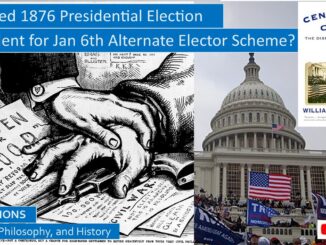
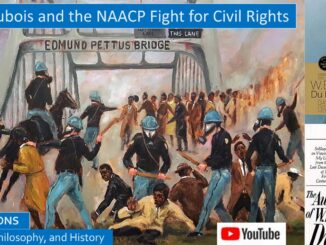
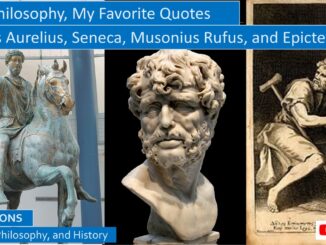
Be the first to comment